

GOVT SAYS NO TALKS UNDER ‘CIVIL DISOBEDIENCE
AS PTI REFUSES TO ‘BOW DOWN’

ISLAMABAD S TA F F R E P O R T
TH E PML-N coalition government at Centre on Tuesday ruled out any talks with the Pakistan Tehreek-e-Insaf (PTI) with the threats of civil disobedience while the main opposition party refused to beg for negotiations
“For the first time, a pleasant breeze came from the opposition [ ] but talks cannot be held at gunpoint ” Defence Minister Khawaja Asif said while speaking on the floor of the National Assembly on Tuesday Speaking on the NA floor on Tuesday, the defence minister lambasted the Khyber Pakhtunkhwa government for prioritising marches on Islamabad instead of the Kurram clashes It is the provincial government s duty to establish law and peace in their respective provinces
Incarcerated PTI founder Imran Khan in a post on X had threatened to launch a “civil disobedience” movement if his demands judicial inquiry into the May 9 2023 riots and November 26 crackdown on PTI protesters and release of its political prisoners are not met
The incarcerated former PM also constituted a five-member negotiation committee comprising Omar Ayub Khan, Ali Amin Gandapur, Sahibzada Hamid Raza, Salman Akram Raja and Asad Qaiser
Earlier this week the reports of the former ruling party and the government s agreement to use the parliamentary forum for negotiation emerged following a meeting between PTI stalwart Asad Qaiser with NA Speaker Ayaz Sadiq However Qaiser dismissed these reports saying that he visited Sadiq s residence for condolences No discussion regarding negotiations took place with the [NA] speaker, he added Similarly,
ISLAMABAD
S TA F F R E P O R T
Pakistan Tehreek-e-Insaf (PTI) vehemently criticized the fake government s representatives for blaming PTI and its unlawfully imprisoned founder Imran Khan for the failure to initiate a dialogue arguing that the real obstacle was the mandate thieves nonsensical approach and authoritarian rule PTI Central Information Secretary Sheikh Waqas Akram, in a stronglyworded statement on Tuesday, lambasted the non-representative government for passing bucks onto PTI for the stalemate in parleys He said that Imran Khan opened the window to talks by presenting two reasonable demands and forming an empowered negotiation committee, demonstrating his commitment to finding a negotiated solution to the current crisis Waqas made it clear that PTI founder s two demands i e releasing unlawfully incarcerated prisoners and
the government has also said that no talks with the PTI have been initiated “Political responsibilities come after constitutional ones Kh Asif said adding that the members of national or provincial assemblies have taken an oath of allegiance to the Constitution Asif noted that no formal talks have been held with the Imran Khan’s party yet emphasising that if they all belong to
Naqvi, Saudi counterpar t reaffir m resolve to fur ther ‘solidif y historic and strategic par tnership’
constituting

crisis Waqas said that the power-hungry clique had already caused irretrievable damage to the country during the past two years during which PTI’s workers and leadership faced all state brutalities and barbarities including the Islamabad carnage adding that even then its leader a prisoner of conscious always opted for a negotiated settlement to the impasse
this House, then matters must be resolved in this building He also termed the PTI’s formation of a negotiation committee meaningless saying that nothing matters when seriousness is lacking Referring to the recently-held Islamabad protest, he slammed the PTI s double standards for not condemning the martyrdom of Rangers and police personnel
The leaders reiterated their resolve to enhance cooperation on anti-narcotics measures and other areas of mutual interest, further solidifying the historic and strategic partnership” between Pakistan and Saudi Arabia
Pakistan s Ambassador Ahmed Farooq Passports and Immigration
Director General Mustafa Jamal Qazi, and Interior Ministry Additional Secretary Riffat Mukhtar Raja were also present during the meeting
Arabia’s continued commitment to supporting Pakistan Both leaders emphasised strengthening bilateral collaboration particularly in combating drug smuggling and addressing shared security concerns Naqvi, in return, highlighted the deep religious and fraternal ties between the two countries Saudi Arabia has always stood by Pakistan during challenging times, and we convey our best wishes for its visionary leadership and people ” he said


GOVT TO ABSORB RS800B PIA LIABILITIES FOR PRIVATISATION, SAYS AVIATION MINISTER

processing and
Business Recorder reported that the disagreement originates from a contract awarded to the CA firm for the audit of Pakistan Revenue Automation (Private) Limited (PRAL) Following a delay in payments the CA firm sought legal intervention through the Islamabad High Court which led to the court-directed release of Rs60 million on June 27, 2024 At the core of the conflict is the timing of services rendered and the applicability of tax laws The CA firm argued that its services were delivered between February 2019 and July 2019 while the relevant sales tax provision under the ICT (Tax on Services) Ordinance, 2001 became effective on July 1, 2019 Therefore, the firm contended that the sales tax
a n d s t e e l s e c t o r r e p o r t e d a s i g n i f i c a n t d e c l i n e o f 1 2 4 2 % P r o d u c t i o n o f b i l l e t s a n d i n g o t s p r i m a r i l y u s e d i n c o n s t r u c t i o n , d r o p p e d b y 2 9 3 2 % , w h i l e
deduction was unjustified as the law was implemented after the completion of services The Directorate General IT & DT has requested clarification from the Member (IR-Policy) regarding the legitimacy of the sales tax deduction and its withholding However no response has been received so far which sources attribute to administrative delays within the FBR Adding further complexity, sources revealed that while the CA firm objected to the deduction, it had not reported invoices for the services in its monthly sales tax returns since 2019 Neither the relevant tax commissioner nor the field formation had previously acted on the issue The court has now been informed that the disputed amount is available on the tax portal for adjustment in upcoming returns
The matter has been exacerbated as other departments reportedly apply higher withholding tax deductions, influenced by scrutiny from the Auditor General of Pakistan (AGP) Sources indicated that the AGP has repeatedly flagged discrepancies in withholding tax deductions due to the lack of robust monitoring mechanisms by the FBR
infrastructure would be leveraged as one of the foundational components for establishing the NTC
solutions “Pakistan has a population of 241 million 64% of whom are under the age of 30 meaning the demographic dividend is a major advantage for the development of e-commerce said Naiel Oberoi lkram Pakistan partner of Gobi China, a Chinese venture capital firm In the past five years, Pakistan’s e-commerce consumption has grown from USD 1 7 billion to USD 4 7 billion a growth rate of 176% Meanwhile e-commerce also dominates the hot sectors attracting investment in Pakistan In 2021, the total investment and financing of Pakistani start-ups reached a record high of USD 365 million among which e-commerce absorbed the
only 2% of GDP compared with 20% in Indonesia the fourth most populous country, meaning the potential for future development of e-commerce is still considerable D


The committee emphasized utilizing Gwadar Port for bulk imports such as wheat sugar and urea The minister suggested a two-part approach: Presenting an overall strategy to integrate Gwadar into the national trade framework through measures aimed to provide enabling business environment Leveraging low-hanging fruits like public sector imports through the Trading Corporation of Pakistan (TCP) The potential for containerized vessel imports and exports via Gwadar was reviewed Members stressed identifying private sector commodities and providing
necessary incentives to encourage trade through Gwadar A proposal to establish a dedicated working group for private sector engagement was discussed The viability of Gwadar Port for transshipment and transit to Afghanistan and Central Asian Republics (CARs) was explored The committee acknowledged the progress made in transshipment initiatives and noted China s interest in leveraging Gwadar under the One Belt, One Road (OBOR) framework It was noted that addressing the cost differential between Gwadar and Karachi would be essential to ensuring competitiveness particularly in government-to-government (G2G) deals with countries like Bangladesh Financial support mechanisms for this adjustment were discussed The committee sought feedback on pending responses from Ministries and
departments for improving business enabling environment for Gwadar port and encouraged further collaboration with logistics experts from the sectoral councils The committee discussed measure to encourage bulk cargoes through Gwadar for enhancing port utilisation significantly A working paper highlighting enabling factors, such as road and rail linkages, insurance facilitation, and security arrangements, will be presented to the prime minister in next meeting The cabinet committee reaffirmed its commitment to transforming Gwadar Port into a cornerstone of Pakistan s trade and logistics ecosystem With targeted policy interventions and coordinated efforts, Gwadar ’s role in public sector imports and regional connectivity is set to expand significantly in the coming years


COMMENT
Prisoners of the sun?
IT seems that the anti-solarization lobby has been hard hit by the decision of the Punjab and Sindh governments to provide protected consumers solar kits Thus far solarization was taking place among the relatively affluent domestic consumer, for he or she did not have to pay (non-existent) generation costs, but did have to put up the capital for generation equipment Now thanks to the initiative of the two most populous provinces, that generation equipment is to be devolved even further, to poor people Instead of working against it, WAPDA should be grateful that it does not have to put up the cost of solarization, and it is likely to retain those consumers as there are still problems to be overcome in the storing of generation excess over consumption Once that happens which is only a matter of time then there will be nothing to stop consumers making an additional investment in what would amount to transmission and dispatch, and gaining total independence of the national grid Perhaps more worrisome is the prospect of industries going off the grid That has already begun to happen, with the result that WAPDA is no longer selling expensive electricity to its best customers If that trend alone spreads, it will sink WAPDS, as it will not be able to pay the capacity charges As the burden of capacity charges increases the tariffs, a tipping point will come when the government begins to switch its connections over The provinces are more so, but all governments have a problem with their power bills and they are collectively the biggest defaulter Settling those bills thus becomes a major issue
There is no use crying over spilt milk and saying that the IPP deals should never have been signed in their present form They were nd they are now heading to break the government financially, and take the country into default However, sticking to obsolete technology despite the compelling financial reasons to opt for solarization is to ignore the facts The government should realize that virtually no one is solarizing for environmental reasons That is a welcome side-effect All are doing so because it is cheaper The efforts to make it dearer will not benefit WAPDA though it might harm the consumer However, now that two provincial governments have stepped to ease the consumers’ lot it will not be easy to reverse the juggernaut of solarization

Dedicated to the legac y of late Hameed Nizami Arif Nizami (Late) Founding Editor
M A Niazi Editor Pakistan Today Babar Nizami Editor Profit


DEMOCRATS are still reeling from the shock of losing to Donald Trump for the second time in the past three elections
There’s quite a bit of finger-pointing and soul-searching taking place with both journalists and activists writing “autopsies” to understand both the reasons for the defeat and what lessons can be learned moving forward I would be more supportive and less sceptical about the merits of some of these exercises were it not for two reasons In the first place, most of these autopsies will be focused too narrowly on this election as if the problems we are facing just emerged this year Secondly if the past is prologue these studies will most likely be read by a few then shelved and forgotten In fact any serious analysis seeking to understand what happened on November 5, must begin with the recognition that the seeds of this year ’s Democratic defeat were planted decades ago and are now bearing fruit A few weeks ago I wrote my own finger-pointing exercise but now I want to look more deeply into the forces that have come to shape the contours of our political landscape Here are some of these factors:
1 Profound political, social, cultural, and economic changes in American life have left millions of voters unsettled, insecure, and angry Unmoored, they are looking for certainty In other similar moments in history populations shaken by such dislocations have turned to forms of fundamentalism finding certainty in a mythic glorious past or to strong leaders who they felt understood their plight
2 In addition to these societal changes, deep scars have been left on Americans’ psyche by dramatic transformative events The terror attacks of 9/11 and failed wars in Iraq and Afghanistan left Americans feeling vulnerable and seeing our stature in the world diminished Add to this the economic collapse of 2008-2009 that shattered confidence in the American dream, all-too-frequent horrific mass shootings, and traumatic impacts of COVID, and you have a society on edge waiting for “the other shoe to drop ”
Beyond the my ths
PAKISTAN was born with its heart divided separated by nearly 1600 km of hostile territory Following over a century of British East India Company rule and another 90 years under the British Raj the Subcontinent finally gained independence What should have been a triumphant culmination of decades of anti-colonial struggle however was marred by unimaginable violence, bloodshed, and profound economic, political and social upheaval While one might point to the arbitrarily drawn borders crafted by British lawyer Sir Cyril Radcliffe who with just five weeks to redraw South Asia s boundaries had little knowledge of the region there are other factors to consider The growing tensions between Hindu and Muslim nationalism, as well as the British divide-and-rule policies, further exacerbated the divide In East Pakistan, conditions worsened in comparison to West Pakistan setting the stage for the eventual birth of Bangladesh While mistakes were made in handling the situation Pakistan s prolonged silence following Bangladesh s independence allowed biased narratives and distorted facts to take root, blurring the lines between truth and fiction This article seeks to challenge those myths with facts providing clarity on the historical realities that have often been obscured Before independence East Bengal was significantly underdeveloped compared to West Bengal It was the poorest region in undivided Bengal, with the lowest levels of urbanization, industrialization, literacy, and electrical power capacity At the time of partition East Bengal had only 314 out of 1 414 factories in the entire province most of which were owned by Hindu industrialists like the Tatas Birlas and Dalmias who shut down their businesses when Pakistan was formed East Bengal lacked jute mills, with raw jute being exported to India for processing However by the 1950s with investments from West Pakistan East Bengal emerged as the largest producer of jute The Pakistani government through organizations like the PIDC and PICIC, encouraged industrial investments in East Pakistan, with families like the Ispahanis leading the way During President Ayub Khan’s industrialization era, infrastructure developments including the Chittagong Port and railway networks were made possible with central government support A common myth suggests that West Pakistan imposed Urdu as the national language on its diverse regions When Pakistan gained independence, each province had its own language, and Urdu already a common lingua franca among Muslims of the subcontinent was chosen as the official language as envisioned by Quaid-i-Azam This did not mean the suppres-
sion of regional languages In fact the government addressed East Pakistan s concerns by recognizing Bengali alongside Urdu in the 1956 and 1962 constitutions
Another myth is the notion that Bengalis were systematically excluded from civil services In fact representation of Bengalis in civil services grew significantly reaching 40 9% by 1969 with 60% of positions in 1966 specifically allocated to East Pakistan Furthermore the myth surrounding Operation Searchlight allegedly launched against innocent civilians fails to account for the violent uprisings that necessitated such actions The Awami League’s militants instigated widespread violence prompting the military to restore order Lastly the claim of a three million genocide has been thoroughly debunked by scholars, including Syed Karim and Abdul Mu min Chowdhury, who found no evidence to support such inflated numbers Research suggests that the actual number of deaths during the conflict ranged between 50 000 and 100 000 Mukti Bahini the armed militia trained and supported by India were the main perpetrators of horrific crimes in 1971 By late 1970 they had begun targeting key infrastructure, such as power plants, railways, industries, and bridges, while also looting banks, raiding warehouses, and killing non-Bengalis The violence was especially directed at non-Bengalis particularly Biharis and over 2 000 were slaughtered Biharis were burned alive in buildings guillotined in jute mills, and thrown into rivers, turning the waters red with the blood of their victims According to American professor Rudolph Rummel around 150 000 Biharis were massacred in this bloodbath Hundreds of West Pakistanis including army officers were also killed in Mymensingh Cantonment where East Pakistan s military personnel revolted and murdered their colleagues, while Bengali mobs hunted down
those trying to escape
3 Given this context political leadership s response to the unsettled electorate is important For their part Republicans have had some success in exploiting and expanding the fear From Nixon s presidency until today, a constant thread in the Republican playbook has been preying on voters’ fears and insecurities Early targets were “Black” welfare recipients or criminals Donald Trump has expanded the list to include immigrants particularly Mexicans and Muslims the deep state and pretty much any group who challenges him Trump has wielded the fear of them as a potent weapon to super-charge his campaign against opponents Democrats, on the other hand, have appeared disconnected from the challenges faced by most voters Instead of speaking directly to their pain Democrats talked about the programmes they had launched the progress they had made in creating jobs saving the environment, protecting women s healthcare choices, and advocating for a balanced approach to immigration While all true, these discourses on policy have sounded “wonky ” making Democrats sound out of touch dismissive or even patronizing What voters have wanted is to know that candidates understand their insecurities and anger The Democrats who ve been effective at doing this have been those to whom
What played out in this election were themes and behaviors that have been brewing for decades. Unless Democrats take a long hard look at how and why they’ve lost connection with working-class voters and allowed consultants to take control of the party’s and their candidates’ messaging and outreach, the defeat of November 5 may well be repeated
The myth that 93 000 Pakistani soldiers surrendered has been widely circulated but the true strength of Pakistan s fighting force was just 45 000 troops which included infantry police rangers and militia
The 93 000 figure was inflated by including non-combatants like civilians and military support staff
Another myth that India's intervention was humanitarian unplanned and spontaneous is far from the truth India s involvement was strategic and premeditated with plans drawn up in consultation with the Awami League leadership
The Indian military had been preparing for months, funding and training Mukti Bahini fighters, even before launching direct intervention Lastly the myth that Pakistan s army did not fight valiantly is disproven by numerous acts of heroism like those of Major Shabir Sharif who displayed exceptional courage in the face of overwhelming odds The Pakistani military's efforts in 1971, though overshadowed by the eventual surrender, should not be forgotten
The creation of Bangladesh did not happen on religious lines it happened due to political differences fueled by bad decisions regional politics and mistrust Moreover the negation of the Two-Nation Theory would mean that after seceding from Pakistan, Bangladesh would merge into India, which it did not
The importance of the Two-Nation Theory is further strengthened by the growing persecution of Muslims and other minorities in India
Prime Minister Narendra Modi inspired by RSS and the Hindutva ideology has successfully proven the validity of Two-Nation Theory
The words of the Quaid-i-Azam accurately describe the current situation in India, “The Hindu Mahasabha wants to treat Muslims like Jews in Germany” As Pakistan acknowledges the past and the role of East Pakistanis in the independence struggle it is time to move forward building a future of friendship and prosperity between Pakistan and Bangladesh
Ahmad Ali is a research fellow at Epis
Think-tank Germany and an intern at Kashmir institute of International relations He can be reached at Ali7664556@gmail com
The importance of the Two-Nation Theory is further strengthened by the growing persecution of Muslims and other minorities in India. Prime Minister Narendra Modi, inspired by RSS and the Hindutva ideology, has successfully proven the validity of TwoNation Theory. The words of the Quaid-i-Azam accurately describe the current situation in India, “The Hindu Mahasabha wants to treat Muslims like Jews in Germany”. As Pakistan acknowledges the past and the role of East Pakistanis in the independence struggle, it is time to move forward, building a future of friendship and prosperity between Pakistan and Bangladesh
Rethinking Academic Appointments
and discuss the quality of research of these laureates
Evaluating an author ’s research output is a complex task that requires the use of multiple indicators Our research group published such pieces in various journals like Current Problems in Cardiology and the Journal of the American Academy of Dermatology, to name a few In fact we also submitted a series of recommendations to the same journal suggesting the use of various indicators to assess the research performance of any author, including Nobel laureates Our suggestions were accepted by Naunyn-Schmiedeberg’s Archives of Pharmacology on Nov 18 This rational approach of using multiple performance measures is important and can also be applied to decisions about high-level academic appointments, such as vice-chancellors, deans, and other leadership positions Unfortunately in several cases the ‘number of publications’ is the only factor that is considered with little to no attention given to other critical indicators
WASEEM HASSAN PESHAWAR
Karachi's athletic future
DESPITE being one of the largest
Understanding the complex histor y of 1971
Dr James J Zogby

International Migrants Day: A Global Crisis and Call for Action

INTERNATIONAL Migrants Day, observed every December 18th, has become a pivotal moment to reflect on the ongoing global migration crisis
With the number of international migrants surpassing 281 million as estimated by the United Nations it is clear that migration is no longer an isolated or localized phenomenon It is an urgent, multifaceted issue with vast implications, shaping the future of societies across the globe The causes of migration are manifold political instability economic disparities environmental catastrophes and increasingly the consequences of climate change We need to examine the state of global migration, its root causes, and the response of governments and international bodies, shedding light on the need for urgent action and cooperation
At the heart of the current migration crisis is the overwhelming number of displaced people caused by war and conflict Take the Syrian Civil War for instance which has resulted in over 13 million displaced individuals since 2011 Neighbouring countries such as Turkey, Jordan, and Lebanon have borne the brunt of the refugee influx grappling with limited resources and mounting social tensions Similarly the war in Ukraine has triggered one of the largest refugee crises in Europe since World War II, with millions seeking refuge in neighbouring countries These conflicts, while distinct in their origins, share a common thread: they create immense suffering and push individuals to flee their homes in search of safety stability and a better life Yet the international community s response to such displacement has often been inconsistent and insufficient
While some nations have opened their doors to refugees, others have erected barriers,
both physical and political, to prevent entry
The economic dimension of migration cannot be overlooked In many parts of the world particularly in sub-Saharan Africa Central America and South Asia economic hardship and lack of opportunity continue to drive large-scale migration Migrants often seek better job prospects, education, and healthcare, all of which are fundamental to improving their quality of life
However the migration of low-skilled labour has been met with mixed reactions in wealthier countries On one hand migrant labor is crucial for industries such as agriculture, healthcare, and construction On the other hand, there is growing resentment toward migrants, fueled by fears of job competition cultural differences and economic strain This tension has given rise to populist and nationalist movements particularly in Europe and the USA which often frame migration as a threat to national security and economic stability In reality, however, migrants contribute significantly to the economies of host countries filling labour shortages and contributing to innovation and growth In recent years a new dimension of migration has emerged: environmental displacement Climate change is increasingly being recognized as a driving force behind migration, with millions of people forced to flee areas affected by rising sea levels droughts and extreme weather events The Pacific Islands for example face the existential threat of rising ocean levels displacing entire communities Similarly, parts of South Asia, including Bangladesh and India, are experiencing severe flooding and crop failures compelling many to migrate
in search of safety and sustenance Despite these challenges the international community has largely failed to address the links between migration and climate change The United Nations Framework Convention on Climate Change (UNFCCC) and other international bodies have yet to adopt comprehensive policies to support climate-induced migrants leaving millions vulnerable to the ravages of environmental destruction Governments must recognize the intersection between climate change and migration and prioritize both climate resilience and migration governance as key elements of global policy
The migrant experience is often marked by hardship as individuals face discrimination, exploitation, and abuse Migrants are frequently denied basic rights and access to healthcare, education, and legal protections This is particularly true for those migrating illegally or through irregular channels who often find themselves at the mercy of human traffickers and smugglers Even those who migrate through legal channels can face bureaucratic hurdles and xenophobic attitudes in their host countries
For example, many migrants in Europe face hostility from local populations who view them as competitors for limited resources This hostility is fueled by misinformation stereotypes and fear often exacerbated by political leaders who use migrants as scapegoats for broader societal issues It is critical that the international community work to dismantle these prejudices and promote the social integration of migrants Governments must create pathways for legal migration ensure fair treatment for all migrants, and foster a culture of inclusion The lack of global governance frame-
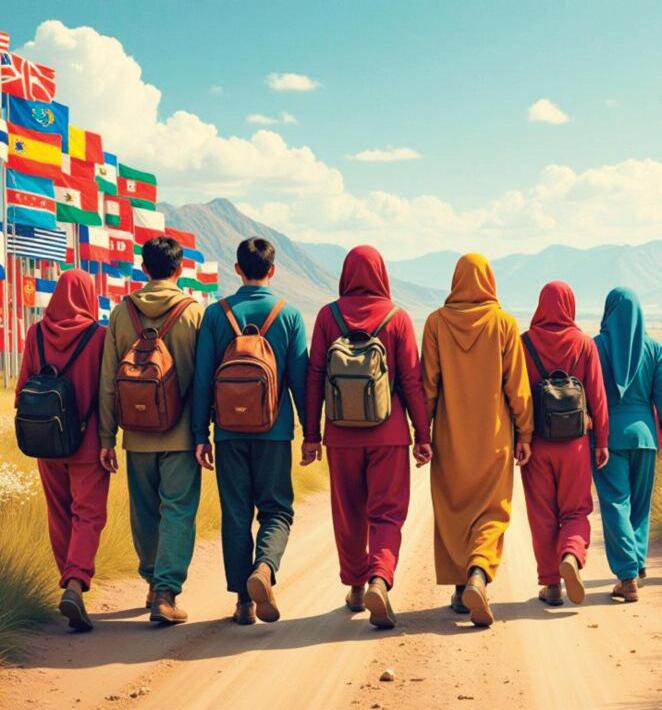
works to manage migration further exacer-
bates the crisis While the Global Compact for Safe Orderly and Regular Migration adopted by the United Nations in 2018 was a step in the right direction, its implementation has been uneven at best Some countries, like Canada and Germany, have embraced its principles, creating more inclusive policies for migrants However others have withdrawn their support opting instead for stricter border controls and more punitive measures The absence of a cohesive international policy means that migrants are often left to navigate a patchwork of conflicting regulations making it harder for them to find safety and stability This lack of coordination has led to unnecessary suffering particularly for refugees who are caught in legal limbo, unable to access the protections they need It is also essential to recognize that migration is not just a crisis, but also an opportunity Migrants bring with them valuable
The migration crisis is not a temporary challenge, but a long-term issue that will continue to shape the global landscape in the coming decades. As we face the interconnected challenges of conflict, economic inequality, and climate change, it is essential that we adopt a comprehensive, compassionate approach to migration, one that recognizes the humanity of every migrant and seeks to create a world where migration is a choice, not a necessity
I n n e w A f r i c a n p r o t e s t m o v e m e n t s , t h e y o u t h a r e l e a d i n g t h e w a y
A s seen in the #Rejec tFinanceB ill protests in Kenya, the #FearlessO c tober protests in Nigeria, and youth-led movements in Uganda and Mozambique, today ’s youth are not merely reac ting to the rising cost of living but are pushing for profound systemic change



it isn t surprising that in this same year, African youth, mobilizing on digital platforms, have come out loud and clear against economic hardship and government inaction The first time we felt digital and social media mobilization in Kenya was in 2019 in the weeks leading up to the 2019 International Women s Day Feminists in Kenya planned and digitally mobilized nationwide protests against femicide to draw attention to the rising cases of femicide and Intimate Partner Violence (IPV) in the country that went with no arrests of the perpetrators or the government addressing the issue The protests were mobilized on social media under the hashtag #EndFemicideKE/#TotalShutdownKE Between August and October, the Kenya National Police Service reported 97 cases of femicide The real numbers must be higher since some of the cases don t get reported to authorities During the 16 Days of Activism 2024 Kenyans across the country held forums to highlight the femicide issue This culminated in nationwide protests held across the country on the International Human Rights Day 2024 calling on the president to declare femicide a national disaster As usual the peaceful protests were met by police brutality with the police teargassing innocent protestors This social youth-led movement, started by Gen Z protesters in Kenya in June, has now spread to Uganda, Nigeria, and Mozambique Waves of young people are rising to challenge electoral malpractices bad governance corruption and tax hikes African youth leveraging social media and operating without funding, have thus emerged as a powerful force for change, echoing the historical independence movements of the mid-20th century With the majority of the protests
driven by men and women under 30 there s significant potential to create long-lasting momentum for good governance, economic justice, an end to corruption, and better electoral management #REJECTFINANCEBILL2024 IN KENYA
The weeks leading up to the first physical #RejectFinanceBill2024 protests in Kenya on June 18 and 19 were dominated by general discontent with proposed taxes on basic commodities like sanitary products, cooking oil, and bread Social media platforms were abuzz with calls of “enough is enough” as platform users explained how much the bill would drive up the cost of living for most average citizens The general feeling was we need to do something about this bill before life got much more difficult than it already was Within days, users had circulated a date, venue, and dress code on social media and were downloading the Zello walkie-talkie app en masse What followed next was historic as young Kenyans in all parts of the country took to the streets to protest the Finance Bill in what became known as the #RejectFinanceBill2024 and #OccupyParliament protests UGANDA, NIGERIA, AND MOZAMBIQUE: SOCIAL MEDIA AND YOUTH
Following Kenya s example anti-corruption protests erupted in Uganda in July Then August and October saw Nigeria s #EndBadGovernance protests and #FearlessOctober protests against the cost-of-living crisis and bad governance In Mozambique, citizens took massively to the streets to protest against electoral malpractices following the October 9 elections
As in Kenya all these protests have more in common than how violently they were dealt with: excessive police force, extra-judicial killings, abductions, torture, and hundreds of injuries
The vast majority of protesters are young people and social media played a pivotal role in getting them out on the street It helped them facilitate real-time updates, coordinate demonstrations, counter misinformation, and obtain legal aid by crowdfunding for arrested activists By circumventing traditional media, young activists exposed abuses and united communities forcing authorities to confront this digitally-savvy and highly organized force LEADERLESS, TRIBELESS, CLASSLESS AND FEARLESS Historically, Kenyan politics has been divided along ethnic and tribal lines with voting blocs often rallying behind leaders from their communities The Gen Z movement however has broken this mold Young activists have shifted the focus from ethnic loyalty to broader issues like equality, social justice, and government accountability Under the “tribeless, leaderless, partyless” tagline the #RejectFinanceBill protests shunned traditional political affiliations and
adopted a spontaneous decentralized model
This approach gave the movement flexibility to adapt quickly to changing circumstances, such as evading police by frequently shifting protest sites Without a clear hierarchy, the protests continued despite arrests, as authorities struggled to suppress an ever-evolving leaderless movement
The Kenyan protests took the government by surprise Previously youth complaints were confined to social media Now, they were on the streets nationwide, transcending tribal and party lines The government’s response was violent resulting in dozens of deaths and abductions Even today police isolate and kidnap perceived protest leaders many of whom end up dead or traumatized from their experiences The Kenya Police Service has however denied this REJECTING SAVIOR POLITICS
Africa’s political history is marked by leaders who position themselves as “saviors” promising utopia while failing to build sustainable systems This narrative has bred disillusionment as youth recognize the need for systemic change, not just individual leaders Gen Z activists across Africa are increasingly demanding transparency and accountability, emphasizing structures that outlast personalities and prevent corruption
This year s protests also signal another shift: African youth are questioning whether their leaders personal politics align with the principles of justice, equality, and inclusion This younger generation is looking beyond mere representation to evaluate leaders on their stance against patriarchy homophobia and tribalism Are they committed to redressing historical injustices and fighting systemic oppression? Activists believe these questions should determine the support any leader receives THE FUTURE OF YOUTH-LED ACTIVISM IN AFRICA
With the majority of activists under 30 Africa s Gen Z is set to reshape the political landscape Supporting these young Africans rather than depending on traditional savior figures, is essential Leaderless, decentralized movements have proven to be effective at disrupting the status quo As seen in the #RejectFinanceBill protests in Kenya the #FearlessOctober protests in Nigeria and youth-led movements in Uganda and Mozambique today s youth are not merely reacting to the rising cost of living but are pushing for profound systemic change Onyonge Mengo is a feminist social researcher and lawyer working to advance internet freedom civil society engagement and knowledge management and transfer She currently serves as the network lead for the European Union System for an Enabling Environment for Civil Society (EU SEE) Program



Giacomelli the head of the Mobile for Development program at GSMA said that large swaths of the world s population still don t have access to mobile internet primarily because of affordability Although the cost of data has dropped radically in recent years, the International
Majid nabi burfat

TRUMP TROLLS TRUDEAU AGAIN AS CANADIAN PM CONSIDERS RESIGNATION
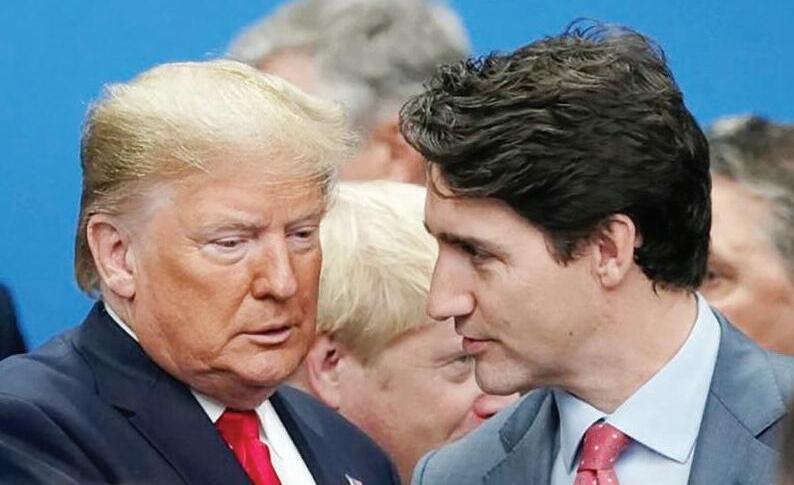

Foreign Minister Wang Yi on Tuesday pledged to position China as a
This initiative marks a revolutionary development as a result of the significant meetings held by Chairperson Benazir Income Support Programme (BISP) Senator Rubina Khalid and Secretary BISP Amer Ali Ahmad with representatives of the Bill & Melinda Gates Foundation and Karandaaz Pakistan during their recent visit to London Under this agreement, Karandaaz Pakistan will facilitate easy and transparent payment of funds to BISP beneficiaries in targeted districts of the country through the RAAST payment system Furthermore, Karandaaz will support a nationwide Digital and Financial Literacy Training program with its trial phase formally beginning on June 30 2025 The agreement was signed by BISP DG (Cash Transfers), Naveed Akbar, and Karandaaz Chief Digital Officer, Sharjeel Murtaza The signing ceremony took place today at the BISP Headquar-
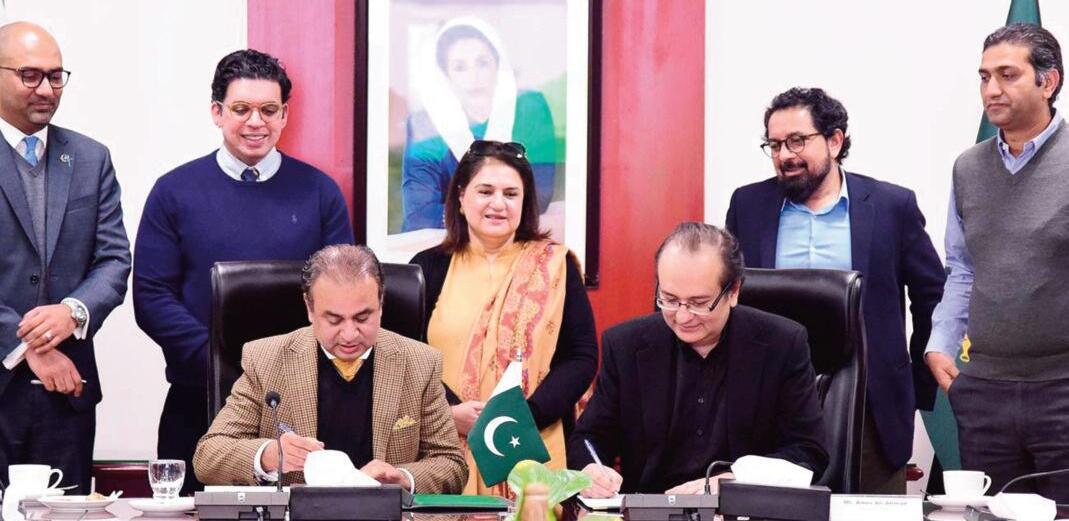
ters and was presided over by BISP Chairperson, Senator Rubina Khalid The event was attended by Secretary BISP Amer Ali Ahmad Additional Secretary Dr Tahir Noor and Director Generals from various departments Waqas Ul Hassan, CEO Karandaaz Pakistan, Syed Ali Mahmood, Country Lead for the Bill & Melinda Gates Foundation Sharjeel Murtaza Chief Digital Officer Karandaaz and Saima Malik Gender Lead Karandaaz were present on the occasion Speaking at the ceremony, Senator Rubina Khalid highlighted the importance of the agreement, stating
that BISP remains steadfast in its commitment to improving the lives of beneficiarie and is continually working to simplify and enhance the efficiency and transparency of its

relations to steadily move forward along a path of independence, mutual achievement and global benefit, he added Five highlights of China’s diplomacy in 2024 Wang shared five highlights of China’s diplomacy over the past year when addressing the symposium emphasizing that China s diplomacy in 2024 had created a favorable external environment for
The China-US economic working group held the 7th meeting on December 12 in Johannesburg South Africa, during which the two sides had candid, in-depth and constructive communication over macroeconomic situations and policies of the two countries and other topics of global challenges according to China s Ministry of Finance on Monday China s Vice Minister of Finance, Liao Min, co-chaired the seventh meeting of the China-US Economic Working Group with Jay Shambaugh the Under Secretary for International Affairs at the US Department of the Treasury during the G20 Finance and Central Bank Deputies Meeting in Johannesburg In addition to macroeconomic situations and policies of the two countries the two sides also had candid in-depth and constructive communication about joint efforts to help low-income countries

tackle liquidity problems, reform of multilateral development bank governance and other topics about global challenges Moreover during the meeting the Chinese side clarified its position on relevant economic and trade issues and expressed concern about the recent US economic and trade restrictions against China
Gao Lingyun an expert at the Chinese Academy of Social Sciences in Beijing, said that in line with previous meetings of the China-US economic working group, officials focused on topics such as macroeconomic policies and China s concerns about the US trade crackdown measures
The main point of the meeting is likely to take stock of [the meetings held under the working group],” Gao told the Global Times on Monday noting that this could be the last meeting of this specific working group as a new US administration is set to take over soon The last meeting of China-US

economic working group was held in Washington in October
The Chinese expert further pointed out that the Chinese side has maintained and will likely maintain the stance of being open to dialogue with the US, while resolutely opposing the US’ crackdowns On Thursday a spokesperson for the Chinese Ministry of Commerce (MOFCOM) said that China has maintained close communication with the team from the US Department of Commerce through the established bilateral communication mechanisms and is also open to engaging with the new US administration s economic and trade team
In another positive development, on Friday, China and the US signed a protocol to amend and extend the Agreement Between the United States and China on Cooperation in Science and Technology and have agreed to extend the Agreement for additional five years, effective from August 27, 2024


Driving Accountabilit y:
How Media Can Address
Pakistan’s Rapid Population Growth

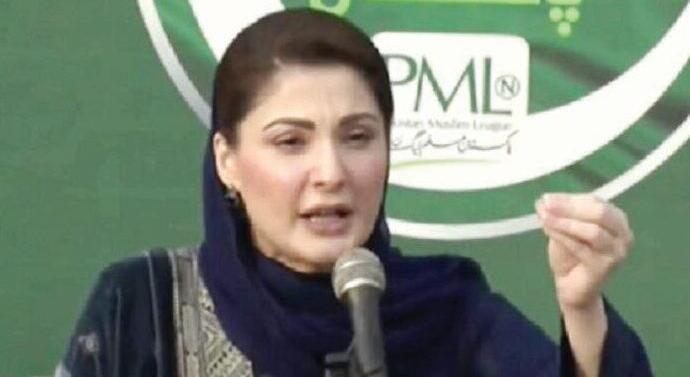

in their entire government They are the home of ignorant people Just have to do propaganda PML-N was highlighted more as a party in China Azma Bukhari said that after Chinese President Xi Jinping, the Vice Chairman scheduled a halfhour meeting with Chief Minister Maryam Nawaz but later extended


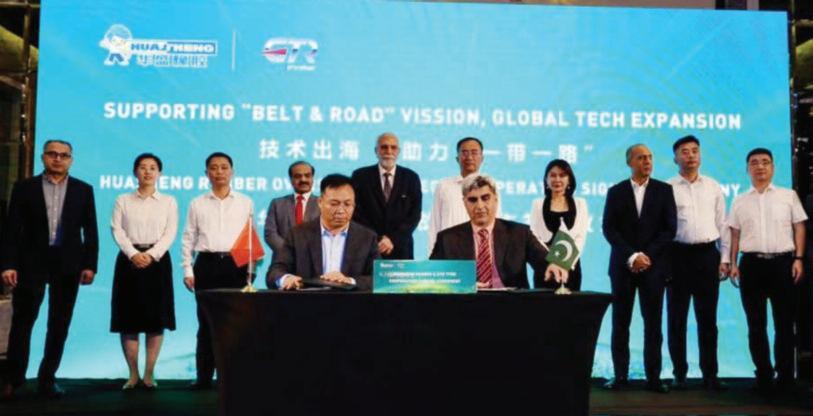




E M A N D S N O T M ET : A L E E M A K H A N

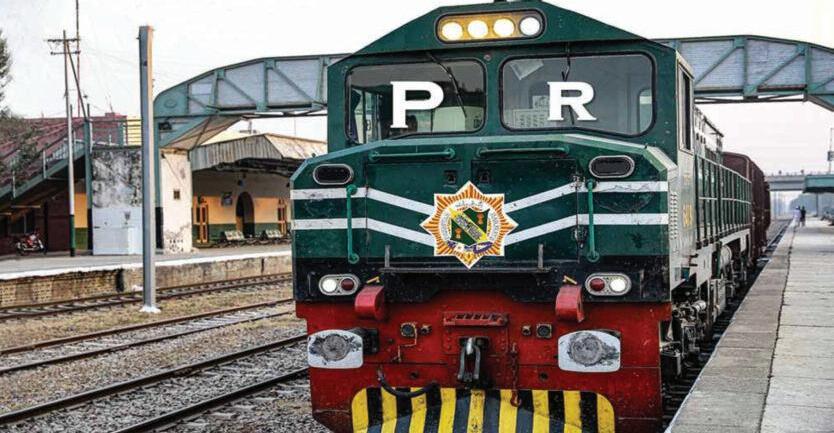
The Muttahida Qaumi MovementPakistan (MQM-P) has extended its support to Jamiat Ulema-eIslam-Fazl (JUI-F) chief Maulana Fazlur Rehman regarding the Madrassah Registration Bill
An MQM-P delegation led by Convener Dr Khalid Maqbool Siddiqui met Maulana Fazlur Rehman at his residence in Islamabad to discuss the country s political situation and the concerns surrounding the legislation The delegation included Sindh Governor Kamran Tessori, Farooq Sattar, and Amin-ul-Haq
Addressing a joint press conference after the meeting Maulana Fazlur Rehman thanked the MQM-P leadership for their understanding and support I appreciate the MQM-P for listening to our position on the matter,” he said Rehman criticized the government for complicating the implementation of the 26th Amendment concerning religious seminaries The law, passed by Parliament,

was obstructed by the presidency We demand its immediate gazette notification, after which any amendments can be deliberated ” he asserted
The JUI-F chief further said that MQM-P had agreed to advocate for their position There is a consensus that MQM-P will take our stance forward and support us in this matter,” he added MQM-P Convener Dr Khalid Maqbool Siddiqui endorsed Rehman s viewpoint calling his ar-
guments logical and meritorious Siddiqui emphasized the need to address the issue without unnecessary delays and added “We will support Maulana Fazlur Rehman’s stance based on its merits
During the discussion Siddiqui also highlighted the MQM-P s concerns regarding local body elections, stressing the need to strengthen grassroots democracy “We are committed to ensuring that basic democratic systems are functional and effective he stated
LHC declares Imran’s plea inadmissible against trial cour t decision
summoned in person to record his statement, relying instead on a written affidavit
Police to initiate probe into PTI protest cases
of an application by incarcerated PTI founder Imran Khan challenging a trial court s decision not to summon Prime Minister Shehbaz Sharif in person for recording his statement in a defamation suit against the former Justice Chaudhry Muhammad Iqbal heard a civil plea of the former prime minister filed through Advocate Shadab Hussain Jafri raising legal objections to the trial court s decision in the defamation case
The lawyer argued that PM Shehbaz had filed a defamation suit against the PTI founding chairman in 2017 but was not being
He said under the law the plaintiff/PM Shehbaz must personally appear in court to record his statement in the defamation suit
He highlighted that the trial court had dismissed objections to the prime minister ’s non-appearance and allowed the statement to be recorded through an affidavit
The counsel asked the LHC to set aside the trial court s decision and require PM Shehbaz to appear in person to record his statement in the suit
After hearing the arguments Justice Iqbal reserved a verdict on the maintainability of the application
President, PM for further strengthening bilateral ties with UAE
ISLAMABAD S TA F F R E P O R T
President Asif Ali Zardari and Prime Minister Shehbaz Sharif have reaffirmed Pakistan’s commitment to further strengthening bilateral relations with the United Arab Emirates (UAE) describing the relationship as a bond rooted in faith, trust, and mutual respect
The President was addressing a reception in Islamabad held to mark the UAE’s 53rd National Day “Eid Al Etihad” Prime Minister Muhammad Shehbaz Sharif, UAE s Ambassador to Pakistan, Hamad Obaid Ibrahim Salem Alzaabi, members of the diplomatic community and government officials attended the event Addressing on the occasion the President said that Pakistan wanted to enhance cooperation with the UAE in key sectors, such as information technology, renewable energy, agriculture, and tourism He invited UAE businesses to explore opportunities in Pakistan’s economy including the Pakistan Stock Exchange, renewable energy, and
ISLAMABAD
